 Petzlover
Petzlover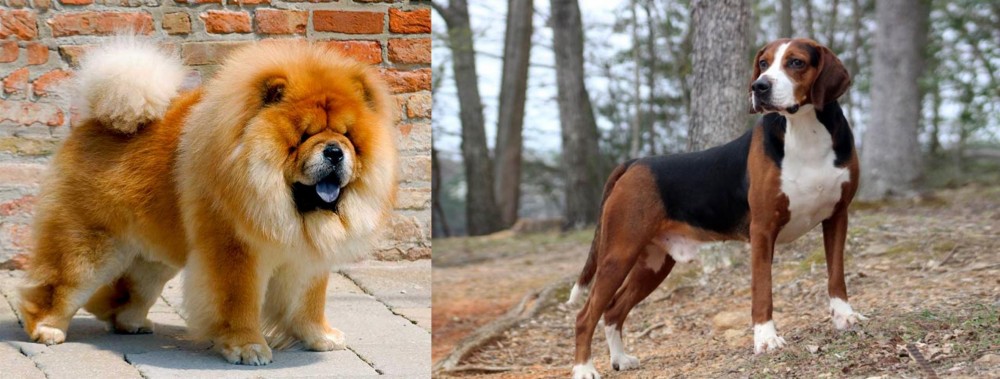 Chow Chow is originated from China but Hamiltonstovare is originated from Sweden. Chow Chow may grow 10 cm / 3 inches shorter than Hamiltonstovare. Both Chow Chow and Hamiltonstovare are having almost same weight. Both Chow Chow and Hamiltonstovare has same life span. Both Chow Chow and Hamiltonstovare has same litter size. Chow Chow requires High Maintenance. But Hamiltonstovare requires Low Maintenance
Chow Chow is originated from China but Hamiltonstovare is originated from Sweden. Chow Chow may grow 10 cm / 3 inches shorter than Hamiltonstovare. Both Chow Chow and Hamiltonstovare are having almost same weight. Both Chow Chow and Hamiltonstovare has same life span. Both Chow Chow and Hamiltonstovare has same litter size. Chow Chow requires High Maintenance. But Hamiltonstovare requires Low Maintenance
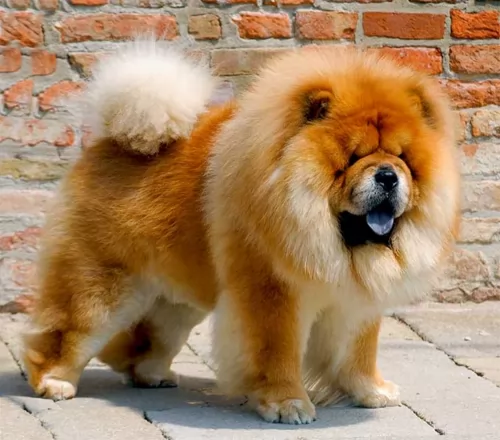 Northern China is the original home of the Chow Chow. In that region of China, the breed was known as the Songshi Quan – “the puffy-lion” dog. They have also been known in China as the “Dog of the Tang Empire” or the Tang Quan. The Chow is believed to be an ancient breed that the Foo Dog, or stone dog guardians of Buddhist palaces and temples, is modeled after. It is one of the most ancient of dog breeds that are still around today.
Northern China is the original home of the Chow Chow. In that region of China, the breed was known as the Songshi Quan – “the puffy-lion” dog. They have also been known in China as the “Dog of the Tang Empire” or the Tang Quan. The Chow is believed to be an ancient breed that the Foo Dog, or stone dog guardians of Buddhist palaces and temples, is modeled after. It is one of the most ancient of dog breeds that are still around today.
It is believed that they have existed for around 2000 years or perhaps even as far back as 3000 years, starting out in Mongolia and migrating to China. The ancientness of the Chow Chow has been validated through DNA testing. In China all those centuries ago, the Chow Chow was born to be a working dog. They hunted, herded, guarded and pulled carts. They went on quests with the Mongolian armies when China was invaded, as well as when the Mongolians invaded the Middle East and Europe later on.
Today’s Canadian Kennel Club has about 350 Chows registered while the AKC gets 10,000 new registrations every year.
 Bred as a hunting hound, the Hamiltonstovare hails from Sweden, being founded in the late 1800s. He was first exhibited in Sweden in 1886.
Bred as a hunting hound, the Hamiltonstovare hails from Sweden, being founded in the late 1800s. He was first exhibited in Sweden in 1886.
Known also as the Hamilton or the Swedish Foxhound, the dog was developed by Count Adolf Hamilton who was also the founder of the Swedish Kennel Club. The dog’s ancestry includes some German Hounds as well as Harriers and English Foxhounds, and this has ensured he has excellent hunting instincts.
This dog breed got the name Hamiltonstovare in 1921 as a tribute to the person who created the breed and also the founder of the Swedish Kennel Club, Count A.P. Hamilton. The Hamiltonstovare isn’t recognized by the AKC but is recognized by the FCI and is also a member of the Foundation Stock Service. He is recognized by the Kennel Club in the UK as a Hound.
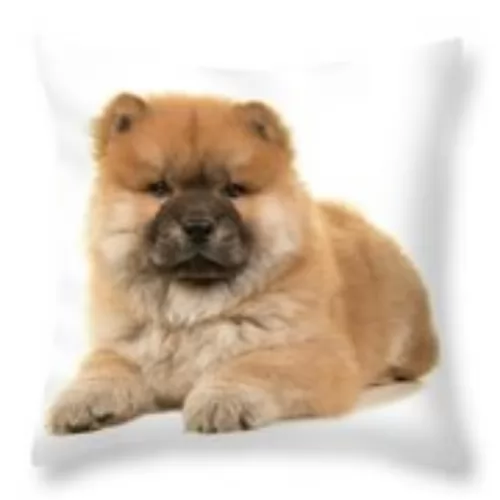 The Chow really does look like a small lion with a black tongue. The dog is sturdy and square with erect, small ears on a broad skull. They have a very dense double coat. Their eyes are deep set and look like almonds, while they all have that very distinctive purple or black tongue. Their lips are also distinctive with their blue color. The nose is black, but some Chows might have a blue nose. The tail is curly.
The Chow really does look like a small lion with a black tongue. The dog is sturdy and square with erect, small ears on a broad skull. They have a very dense double coat. Their eyes are deep set and look like almonds, while they all have that very distinctive purple or black tongue. Their lips are also distinctive with their blue color. The nose is black, but some Chows might have a blue nose. The tail is curly.
These are medium size dogs when it comes to height and weight, but they are powerfully built for their size. Their power is in their compact body holding the energy and strength of a much larger dog. Its hind legs are almost entirely straight, unusual for any dog. They get their lion appearance from the huge ruff that stands behind their heads. Their chest is broad and deep.
 The Hamilton Hound is a good looking, well proportioned dog with an attractive, 2-layered, shortish, smooth, tri-colored coat of tan, black and white.
The Hamilton Hound is a good looking, well proportioned dog with an attractive, 2-layered, shortish, smooth, tri-colored coat of tan, black and white.
These dogs stand at about 49-61cm in height and they weigh 23 – 27kg. The eyes are brown and the ears are floppy. He is a deep chested dog with a long tail which he carries straight or which is somewhat curved. He has a longish head with a skull that is slightly arched and broad.
Friendly, social and amicable, the even-tempered Hamiltonstovare is a dog that loves to be with his human family. When you look at him you look at him as a friend as he has a calm, intelligent expression about him.
He is a stubborn, non-aggressive dog that is intelligent and this makes it easy to have him trained and socialized to make him obedient and to follow some easy instructions.
He is a very active dog and will love an owner who leads an active, outdoor life. Most Hamiltons love swimming too and he will be thrilled if you plunge in with him on a hot day.
He has always been a hunting dog, and while they love spending time with their human family, he loves the thrill of the hunt. He is a playful dog too, loving to entertain and be entertained, and he gets on well with children.
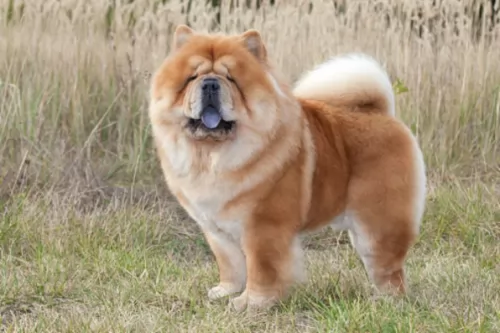 Loyal and true to their family and those they know; the Chow Chow is a little standoffish with strangers. They are very protective and usually attach themselves to one or two people. They are intelligent but stubborn, which can affect your training with them. They need to respect their people and Chows respect hose who take care of them. They can be aggressive toward dogs of their same sex especially if those dogs are the same breed as well.
Loyal and true to their family and those they know; the Chow Chow is a little standoffish with strangers. They are very protective and usually attach themselves to one or two people. They are intelligent but stubborn, which can affect your training with them. They need to respect their people and Chows respect hose who take care of them. They can be aggressive toward dogs of their same sex especially if those dogs are the same breed as well.
They are known to be very clean and many have compared them to cats in that regard. They appear to be dignified and refined. They are usually very quiet but very adaptable dogs.
 Hamiltonstovares make wonderful companions simply because they’re friendly dogs with stable personalities.
Hamiltonstovares make wonderful companions simply because they’re friendly dogs with stable personalities.
He is actually an ‘all-rounder’ dog – well proportioned and good-looking and with a solid personality to match.
He is lithe and muscled and as a multi-purpose dog, he has been used to follow scents and hunt down prey. These skills as well as his loyal characteristics have made him a versatile, sought after pet.
Another bonus when you own a dog like this is that he is also a low maintenance dog, shedding very little. He is intelligent too and easy to train, and all these qualities make him a wonderful pet to own.
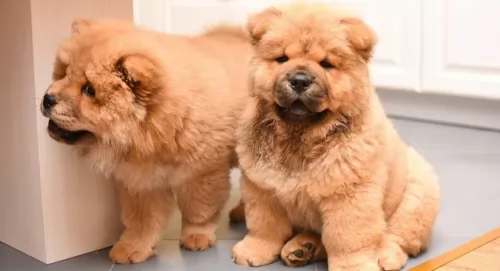 Although an ancient breed that obviously has survived many centuries of trials, the Cho Chow of today is prone to several different health conditions. These include:
Although an ancient breed that obviously has survived many centuries of trials, the Cho Chow of today is prone to several different health conditions. These include:
This condition can require surgery to keep the turning eyelid from injuring the eye ball.
This can cause lameness and arthritis.
This can cause lameness and arthritis.
Make sure you keep the ears clean and keep an eye on them.
 Every dog has different genetic make ups that affect them and they have different susceptibilities to illnesses. The average life expectancy of a Hamiltonstovare is between 10 and 13 years when he is looked after and well nourished with top quality food.
Every dog has different genetic make ups that affect them and they have different susceptibilities to illnesses. The average life expectancy of a Hamiltonstovare is between 10 and 13 years when he is looked after and well nourished with top quality food.
Some things to look out for are hip dysplasia, cancer, bloat and obesity.
Look out for obesity in your pet because just like with people, obesity leads to other diseases and complications in dogs such as diabetes, respiratory disorders, osteoarthritis and hypertension.
If your dog needs to lose weight, and you just don’t know how you’re going to deny him the treats he loves, speak to your vet who can even work out a weight management program for him.
Cancer is a formidable threat to all dog breeds. The most obvious sign that your dog could have cancer is abnormal swelling that gets larger under the skin. The idea is get get the lump removed and biopsied as soon as possible. Loss of appetite, weight loss, sores that don’t heal and bleeding or discharge are all signs of cancer.
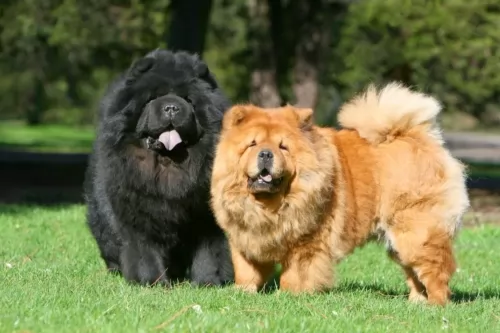 Don’t overfeed a Chow Chow as they are hard workers and big eaters. Feed them at least twice a day.
Don’t overfeed a Chow Chow as they are hard workers and big eaters. Feed them at least twice a day.
This eye disease can lead to blindness if not checked and treated.
These can be removed from an adolescent puppy.
Again, the Chow is susceptible to cancer.
Can lead to heart or kidney problems if left untreated.
Keep a close eye on your Chow Chow skin.
The Chow Chow was developed as working dog, but today’s version is more laid back and doesn’t need excessive exercise. Daily walks will suffice. They live very happily in the city if walked regularly. They are not really a competitive breed outside of obedience and confirmation. They are seldom seen in sports like agility or frisbee.
 The Hamiltonstovare has a double coat but even so, he is a low maintenance breed that will simply require a brush twice a week to remove dead and loose hair.
The Hamiltonstovare has a double coat but even so, he is a low maintenance breed that will simply require a brush twice a week to remove dead and loose hair.
Because he has floppy ears, it is important to check his ears because too much wax and debris can lead to a painful infection.
This is a high energy dog who will need the right amount of exercise as well as mental stimulation to be at his best. A nice walk every day will be excellent for him as well as the usual ball games in the garden.
If you get your Hamilton puppy from a breeder, it would be wise to stick to the same food they were feeding your puppy with. Suddenly changing his good could cause digestive upsets.
Every Hamilton requires top quality food that meets all his nutritional requirements. If you give him commercially manufactured food, make sure to follow the instructions with regards to the amount of food you give him as he can put on too much weight.
These dogs are known to suffer with bloat, so rather give him smaller meals than one large meal a day. Your Hamilton should never be exercised immediately after eating a meal. Remember to always ensure a bowl of fresh, cool water is always available.